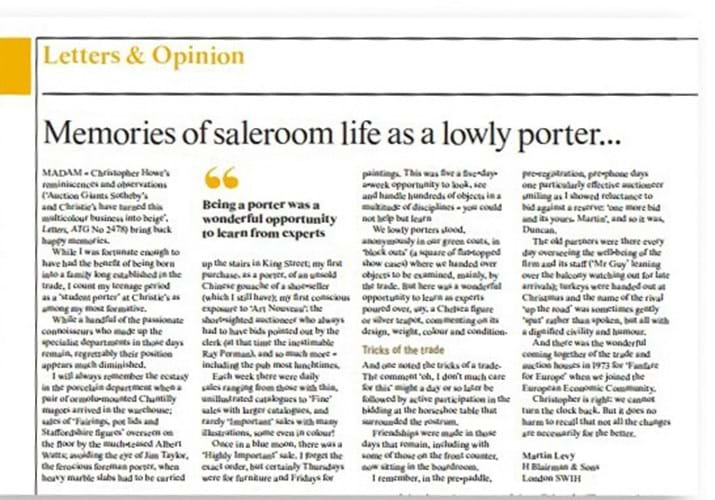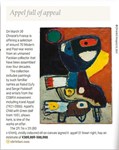
Just over 60 years ago, aged seventeen and a half, I got a job at Knight Frank and Rutley, as it was then styled.
I worked in the Country (House) Department for a few months but found myself drawn to the weekly antique auctions held on Thursdays and Fridays at the back of the No 20 Hanover Square premises.
I soon discovered that while we all had to arrive by 9.30, and juniors sign the book and be above the line drawn by the fierce ex-RSM commissionaire, once ‘in’ one was free until about ten to ten as the negotiators (to one of whom I was ‘the boy’) had a daily meeting with the partner in his office until that time. If his phone did ring someone else would answer it.
Thus when arriving early and carrying a piece of paper or a file I could quietly view the weekly offerings displayed for the forthcoming sales just down the corridor for well over an hour.
Learning process
Here one could learn a little from the catalogues, and also from the knowledgeable older porters.
I soon learnt that there was a back door, onto Bond Street, and one could similarly slip out and view the duo firm of Phillips Son and Neale, and Puttick and Simpson, jointly housed in Blenheim Street, and if time allowed, also nip down the road to Sotheby’s, which had weekly picture sales as well as furniture sales.
Lack of funds
My main problem was lack of funds. I was paid £5 a week with a deduction of 10 shillings (50p), which left me at some disadvantage, as my board and lodging in a genteel ‘young persons’ hostel was £5. My father generously made up the shortfall with all he could manage by giving me £14 a month. With travel to work (one walked home to South Ken) and half a crown (12.5p) for a light lunch, together with other minor expenses, something had to happen.
With parental influence I was able to transfer to the auction department, my father having served with one of the partners during the war.
I now fell in with a rather disreputable character who explained to me that with cunning, it was possible to make a purchase at Phillips, or Puttick and Simpson, and not pay for it until the following week’s sale if one was trade.
The trick was to take the purchase(s) down to the Portobello Road on a Saturday morning when one was free and sell them for cash. Risky but not impossible, it seemed.
Five pounds did not buy much then, but mixed lots of a Newhall teapot, a Caughley jug and a cracked Vincennes dish might come down for three guineas (£3.15).
Each of these might realise two or three pounds if flogged to the right person on a Saturday, and payment for the lot be resolved by the next Tuesday and leave some change. Soon I had a very small fund.
One item that kept re-occurring was a seemingly endless supply of brass telescopes on stands. They made a fiver on average. Being very attractive, they soon went out on Saturday at around a tenner. Good money. Easy!
Bonus to be spent
Christmas time soon approached. The wages were usually paid on a Thursday. As Christmas Day was a Friday, we were to be allowed home at 3pm on the Thursday and the wages were to be paid on the Tuesday.
The pay packet lay on my desk, and I opened it. Oh dear – something was wrong, a mistake had been made. Apart from the usual four £1 notes and a 10 bob note someone had inadvertently put in two crisp white £5 notes, something one seldom saw and never had. I went to the senior sales clerk for advice as to how to return the money. He laughed at me. “You have got a bonus from the Partners, dear boy.”
Early that morning I had viewed the Sotheby’s weekly furniture where I had seen a Georgian open armchair that I coveted. It had claw and ball feet, splat back and the open arms terminated in eagles’ heads. Scottish I assumed. Now I had funds beyond my dreams.
I slipped out during the morning of the sale making an excuse. The main saleroom there was virtually empty, as most were at Christmas lunch parties. “Five pounds for this, six… yours, sir… no, seven …eight if you like… it is yours, sir. Name please.”
I owned a chair and still had funds to pay the barmaid in the Coach and Horses pub opposite, who had loaned me some money to pay for a round of drinks the night before; and also for the rail fare home for Christmas.
The chair was quietly smuggled into Knight Frank’s and I used it for several months at my desk, where it was admired by all comers.
Wise words
Eventually events overtook me. It had to go. Staff could sell there without any charge. I entered it into the secondary saleroom with a £12 reserve. The sum I badly needed.
One of the old porters who were allowed to accept bids, took me aside. “Mr Simon,” he said “this chair of yours, what does it have to make?” “£12” …. “Nah,” he said, “put £22 on it…” “But…” “Do as I say Mr Simon.”
The chair fetched £24! I gave old Bert £2… “Now you are a proper young gentleman.”
I saw the chair again some 25 years later at Christies, where it made £18,000.
Simon H Waters
Pebworth, Worcestershire












